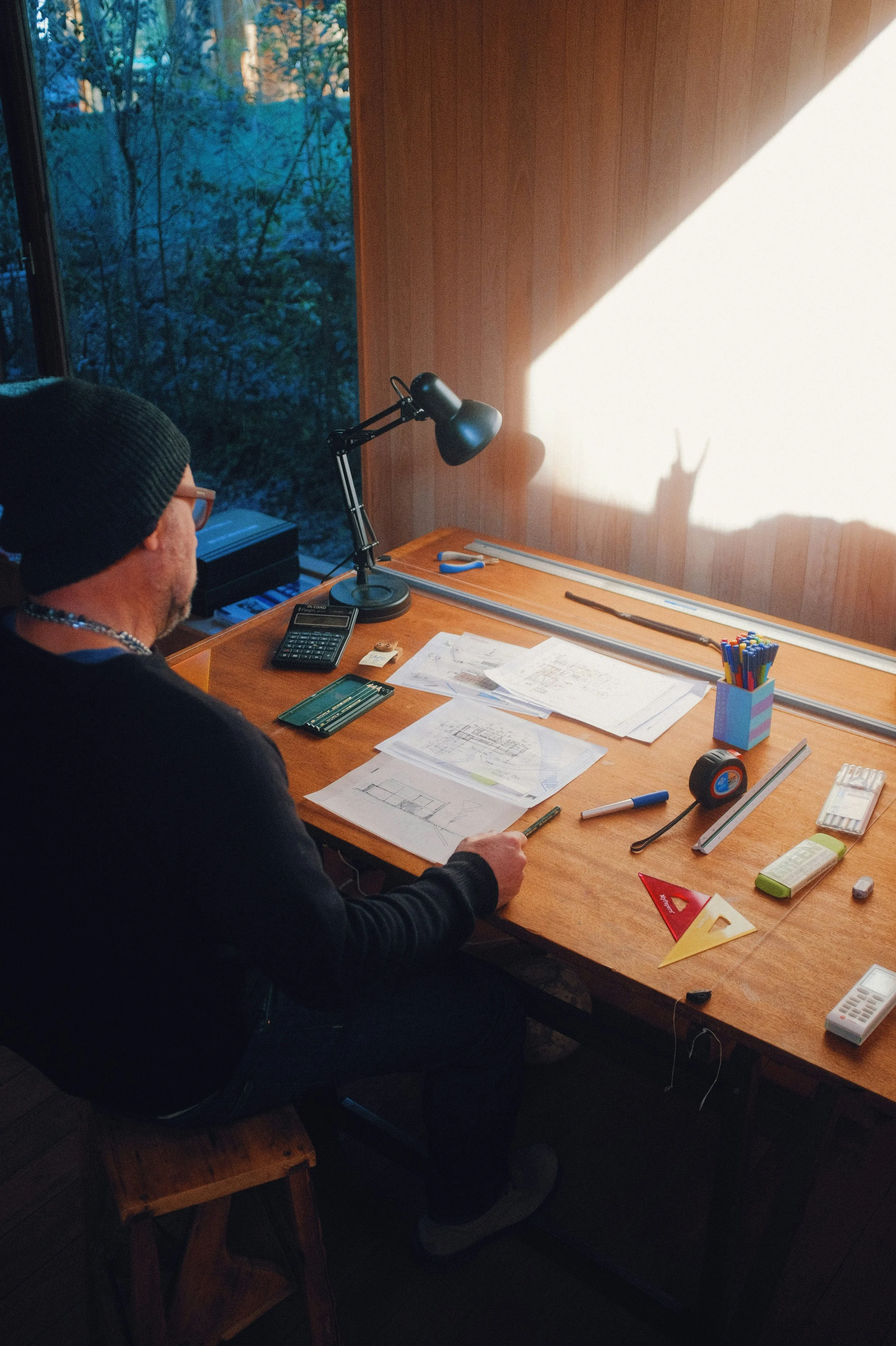Imposter Syndrome: The Hidden Fear Crushing Mid-Career Architects
You’ve been licensed for 8 years, your projects are getting published, and you still Google “how to calculate structural loads” at 2 a.m. hoping no one notices.
The dirty truth – that partner who seems bulletproof? They’re doing the exact same thing.
Mid-career is where imposter syndrome gets nastier because now you’re supposed to be the expert everyone else Googles.
And unhealed imposter syndrome can have actual dangerous consequences in a field like architecture.
But the high-achieving, perfectionist traits that got you where you are now, are the same ones making you feel inadequate at a job you definitely deserve.
Here’s why you don’t feel good enough despite your years of experience and education, and how therapy for architects can help repair your confidence so that you take the right kind of risks at work – the ones that boost your career instead of generating potentially faulty designs.
Mid-Career Imposter Syndrome: The Sneaky Trap No One Warns You About
You know more than you did on day one of your job, but you still don’t feel like an expert. Guess what? That’s a GOOD thing – you should ALWAYS feel like there’s more to learn and be striving to improve yourself, especially in a job you’re passionate about.
So why do you feel like such a fraud? Here’s what’s really happening: you’ve moved past the “learning everything” phase but haven’t hit “senior sage” status. You’re in architectural purgatory – too experienced to ask basic questions, yet not experienced enough to feel bulletproof.
The real kicker? Architecture school taught you how to design, not how to navigate situations like:
- Client meetings where you’re suddenly the “building expert” on topics you barely touched in school
- Younger architects looking at you like you have all the answers
- The assumption that 5-10 years of experience = omniscience about everything from zoning codes to construction sequencing
This is where imposter syndrome thrives - in the gap between others’ expectations and your internal reality.
3 Lies Mid-Career Architects Tell Themselves
I’ve worked with enough architects in business therapy to know the lies they tell themselves when they’ve reached a certain stage in their careers.
These lies not only keep them stuck where they are professionally, but also creep into other areas of life (like dating, family relationships, etc.) and make those suffer, too.
Here are three of the most common lies mid-career architects repeat to themselves, day after day (even subconsciously):
Lie 1: “Everyone else figured this out years ago”
Reality check: That architect who seems to know everything? They’re probably expert-level at one thing and winging it on everything else, just like you. The difference is confidence in their ability to figure it out. I’ve found in therapy for architects that this comparison trap is super common in the profession.
Lie 2: “I should know this by now”
The truth: Architecture is impossibly broad. No one knows it all. There will ALWAYS be more to learn, no matter what level you reach – and that’s exciting and inspiring! The partners at big firms have teams of specialists because even they can’t master every aspect. This perfectionist thinking that plagues high-achieving professionals often comes up in our online therapy sessions.
Lie 3: “If I admit that I don’t know something, I’ll lose credibility and respect”
The insider secret: Clients trust architects who say “I need to research that and get back to you” more than those who BS their way through answers. Competence isn’t knowing everything – it’s knowing how to find reliable answers. Just make sure you follow through on the “getting back to you” part, and you’re golden. You’ll only lose credibility and respect if you get caught in a lie.
The Confidence Reset: 4 Exercises Based on Therapy for Architects
Look, I’m not gonna waste your time with the usual confidence-building techniques – most of those are bullshit anyway, and you need something tailored to your specific situation.
I recommend entrepreneur therapy to dig into the foundation of your confidence issues – but in the meantime, here are a few exercises drawn from business therapy that you can try on your own:
Exercise 1: The Knowledge Audit (Week 1)
List every project responsibility you’ve handled in the past year. Next to each, rate your confidence 1-10. Notice patterns – you’ll see you’re actually competent in more areas than you think. The goal here isn’t perfection; it’s recognizing your actual skill range. And, if you still don’t feel competent, at least you have a better idea of where you need to focus your research to learn more.
Exercise 2: The “I Don’t Know” Practice
Deliberately use “I need to verify that” or “Let me research the current code requirements” in one meeting per week (not a vague “I’ll get back to you” or an “I don’t know” with no follow up about finding the answers, but a genuine promise to look into it – and be sure to follow through). Track responses. You’ll likely discover that clients appreciate thoroughness over quick answers that might be wrong.
Exercise 3: Reverse Mentoring Setup
Find one junior architect and one senior architect to connect with monthly. This could be a quick email, phone call, coffee date, brief office meeting, or whatever works. With the junior, you’ll realize how much you actually know by helping them. With the senior, you’ll see that even experienced architects continuously learn. Both interactions normalize not knowing everything.
Exercise 4: The Specialty Declaration
Pick 2-3 things to become your “go-to” areas of knowledge (sustainable design, healthcare projects, historic preservation, etc.). Consider these your pillars of expertise, and stop trying to be an expert in everything. Even the most famous architects are known for specific strengths, not universal knowledge.
The Truth About Architecture Expertise and Remote Therapy
Here’s what entrepreneur therapy can teach you that architecture school won’t: competence isn’t about having all the answers.
It’s about having reliable systems for finding answers and the wisdom to know when you need help.
The most dangerous architect isn’t the one who doesn’t know something – it’s the one who pretends they do.
So if you’re ready to start building your confidence and demolishing your imposter syndrome, I’m here to help.
I’m an entrepreneur therapist in Portland, and I am licensed to provide online business therapy and EMDR therapy in Washington, Wisconsin, Colorado, Oregon, Arizona, and Florida.
Stop letting imposter syndrome be the designer of your career.
You’ve already proven you belong here – now it’s time to start believing it.




